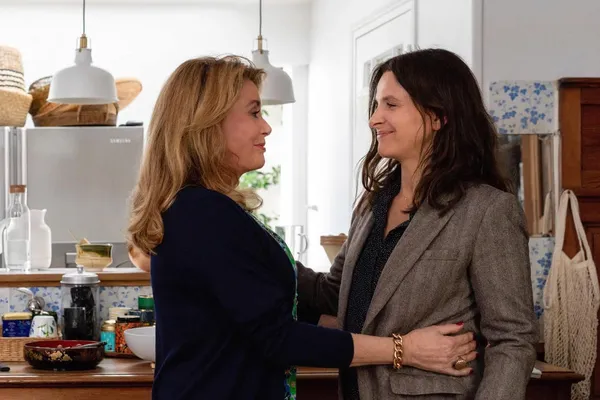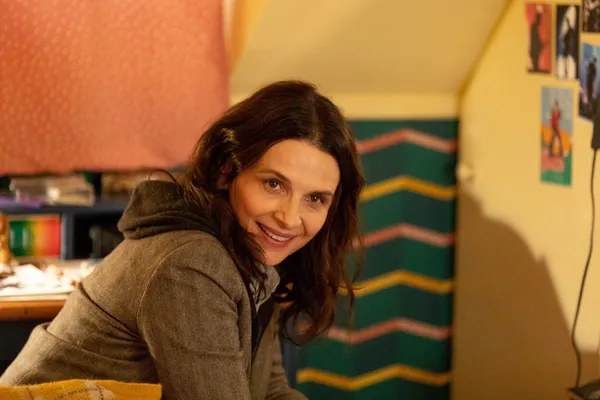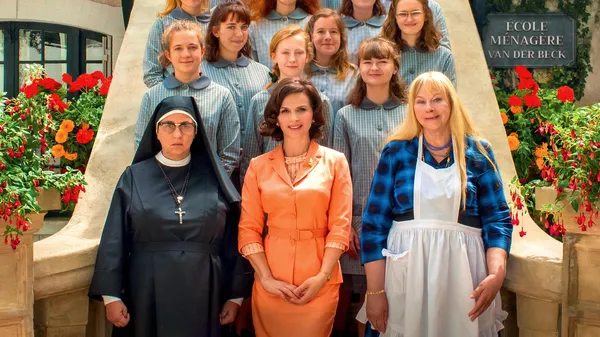 |
| Catherine Deneuve and Juliette Binoche as mother and daughter in The Truth. Binoche: 'There was a sparky humour between us' Photo: Unifrance |
When two of the major stars of le cinéma français Catherine Deneuve and Juliette Binoche came together for the first time under the aegis of Japanese director Hirokazu Kore-Eda in The Truth (La Vérité) something had to give.
Binoche, in an interview as part of the Unifrance Rendezvous with French Cinema in Paris earlier this year, revealed her ice-breaking technique with some relish. “We had not had time to get to know each other before the shoot. Catherine has a reputation for keeping her distance but it was fun working with her. It took time to find the path to reach her so I resorted to my box of tricks. I knew she smoked a lot and although I had given up, I started again. I asked for a cigarette and she refused … I was a bit surprised and told her (using the familiar form of tu) that I would give it back.
“Deneuve later gave me a cigarette and I smoked it, victorious … the next week I brought her a packet of cigarettes and she joked that they were the wrong ones! As a result there was a sparky humour between us.”
Hirokazu’s first film shot in France and in French, pits the two of them at daggers drawn with Deneuve as a film diva and Binoche as her daughter. Although the director doesn’t speak French or English, Binoche sensed it would all work out when they had an initial lunch together. “I said I would love to work with you. It was as simple as that. I could see his spirit and his way of working and I knew that I wanted to spend time with him and make the film.”
Binoche added: “There were three translators on the set but the real language of the film is underneath. As an actor you are playing with words, but also with what is not said.”
The actress says she could recognise the stresses and strains in the relationship. “When you have a strong passion for something I can well understand it can be heavy for the people around you. I understand the daughter’s anger because she does not have the distance but don’t mix me up with the character,” she said.
And before that she was the only actress in contention for Safy Nebbou’s Who You Think I Am (Celle que vous croyez), playing Claire, a university lecturer and mother of two teenage boys who invents a Facebook profile of herself as Clara, a vivacious 24-year-old blonde and embarks on a clandestine affair with a young man. Nebbou told me: “Juliette just came in to my head - and that was it. I knew her a little bit and I had always wanted to work with her."
At 56, she admits that the roles are becoming ever more interesting. She suggests that as you get older, “you get rid of stuff. Your values are changing without you being conscious of it. I would say there is a liberation somehow. It depends, of course, on who you are working with. There has to be a strong relationship of trust. In a movie because it is a collective art, you need each other, and you need each one another’s trust. It has to be back and forth”.
Binoche was born of acting parents, both Communists and at early age was sent off to boarding school. Her father Jean-Marie Binoche worked mainly abroad as the director of a masked puppet theatre. Her mother, an actress Monique Stalens, separated from him when Juliette was just four. Theatre became an escape from her relatively solitary childhood.
 |
| Juliette Binoche: 'Your values are changing without you being conscious of it. I would say there is a liberation somehow' Photo: Unifrance |
She became the high profile face of the perfume Poême for Lancôme although it was not purely for personal gain: rather the proceeds went to children's charities in Cambodia
She used to be described as a modern Garbo, throwing a fiercely protective shield around her private life and honing her ability to be monosyllabic to a fine art but she has loosened up a lot.
She appeared in more than 60 feature films, won numerous awards and appeared on stage and screen all over the world. Most recently before the lockdown in France her new film How To Be A Good Wife (La Bonne Epouse), by Martin Provost, was top of the Gallic box office charts.
The comedy, also featuring Noémie Lvovsky, Yolande Moreau, Edouard Baer and François Berléand, is set in the Sixties in an all-girls schools in a provincial town where the pupils are trained to be “perfect housewives.” They are taught to keep house and fulfil their marital duty without flinching. Imparting the message is the school’s head Paulette Van der Beck (Binoche), together with her sister-in-law Gilberte (Moreau) and her sister Marie-Thérèse (Lvovsky). As the story unfurls on the eve of May 1968, Binoche’s character is about to see all her certainties falter, all complicated by the return of her first love (Baer) as well as the air of freedom blowing over France. She ponders: what if this good wife finally became a free woman?
Having performed in several stage productions, Binoche scored film work with auteur directors such as Jean-Luc Godard (Hail Mary, 1985), Jacques Doillon (Family Life, 1985) and Andre Techiné who made her a star in France with the leading role in his 1985 drama Rendez-Vous. Her sensual performance in her English-language debut The Unbearable Lightness of Being (1988), directed by Philip Kaufman, launched her international career. She also worked with Krzysztof Kie?lowski in Three Colours: Blue (1993), a performance for which she won the Venice Film Festival Award for Best Actress and a César. Binoche gained further acclaim in Anthony Minghella's The English Patient (1996), for which she was awarded an Academy Award and a BAFTA for Best Supporting Actress in addition to the Best Actress Award at the 1997 Berlin International Film Festival.
And for her performance in Lasse Hallström's romantic comedy Chocolat (2000), Binoche was nominated for an Academy Award for Best Actress. During the 2000s she alternated between French and English language roles in both mainstream and art-house productions. In 2010, she won the Best Actress Award at the Cannes Film Festival for her role in Abbas Kiarostami's Certified Copy making her the first actress to win the European Best Actress Triple Crown (for winning best actress award at the Berlin, Cannes and Venice film festivals).
 |
| Sixties flashback for (front from left) Noémie Lvovsky, Juliette Binoche and Yolande Moreau in Martin Provost’s comedy How To Be A Good Wife Photo: © Carole Bethuel - Les Films du Kiosque |
She takes adulation and prizes in her stride. “Let’s face it - it is touching to receive a prize. As actors we give something that is quite abstract in a way, it is something about part of your soul that you are giving. Recognition has a warm feeling, but you should not take it too seriously. It is just a symbol.”
Throughout her career, Binoche has intermittently appeared on stage, most notably in a 1998 London production of Luigi Pirandello's Naked and in a 2000 production of Harold Pinter's Betrayal on Broadway for which she was nominated for a Tony Award. In 2008 she began a world tour with a modern dance production In-i devised in collaboration with Akram Khan.
Other notable performances include: Mauvais Sang (1986), Les Amants Du Pont-Neuf (1991), Damage (1992), The Horseman On The Roof (1995), Code Unknown (2000), Hidden (Caché) (2005), Breaking And Entering (2006), The Flight Of The Red Balloon (2007), Camille Claudel, 1915 (2013), Clouds Of Sils Maria (2014), Ghost In The Shell (2017) and Let The Sunshine In (2017). Other recent works include Naomi Kawase's Vision (2018 and Olivier Assayas' Non-Fiction (2019).
How does she keep her passion alive? After heaving a sigh she adds: “The need of finding the truth keeps the passion going; the need to reveal something hidden, and the need of sharing and loving and exploring … and of flying…. Yes, that’s it: in a metaphorical way film makes me fly.”
Binoche still likes to paint as a hobby but with work and domestic commitments she does not have a lot of time. “Look … I have my two kids [daughter Hana and son Raphael both in their 20s] as well as my father and my mother to look after. You try to do one thing after the other, one step at a time.”
The Truth is now available to watch on Curzon Home Cinema after the closure of UK cinemas.
























